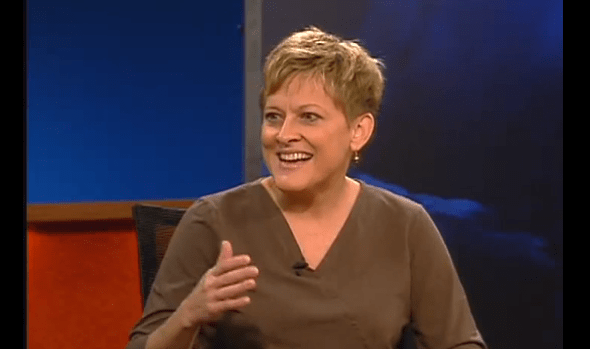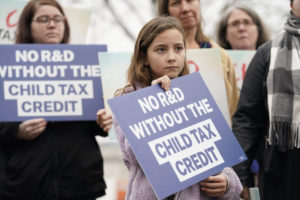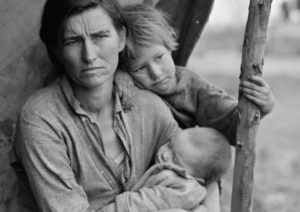Truthdigger of the Week: Dr. Kathryn Edin (Video)
Over decades of studying the lives of America's poor, the Johns Hopkins sociologist has combined analytic rigor and compassion for others to defy popular prejudice and discover the hidden causes of mass behavior.Over decades of studying the lives of America's poor, the Johns Hopkins sociologist has combined analytic rigor and compassion for others to discover the hidden causes of mass behavior.
Many of us don’t enjoy being told we’re wrong about things we feel we know well. Nonetheless the march of progress — which, admittedly and altogether, seems to have stalled for a length of time — requires that a committed and thick-skinned few occasionally turn our presumed understanding upside down and see what falls out.
Kathryn Edin is such a person. A Johns Hopkins University sociologist, Edin, 51, became “one of the nation’s preeminent poverty researchers” over a course of decades living among her subjects in some of “the most dangerous, impoverished neighborhoods” in America, reports Mother Jones magazine in an article published March 25. (Those towns include Camden, N.J., a massively impoverished city that Truthdig columnist Chris Hedges has written about extensively and that he describes as one of capitalism’s “sacrifice zones.”) “Unlike academics who draw conclusions about poverty from the ivory tower,” the magazine continues, “Edin has gotten up close and personal with the people she studies” and in the process has “shattered many myths about the poor, rocking sociology and public-policy circles.”
The myths may be more honestly described as prejudices. They include the notions that poor, black, unmarried women have children in order to qualify for welfare benefits; that unemployed black fathers abandon their children whenever they can; and that marriage disappeared in low-income neighborhoods because of what right-wing pundits identify as “cultural decay and immorality.”
Interviews with hundreds of low-income parents revealed a picture that is much more human than the brute calculus of economic survival that has been assumed in headlines and policy discussions ever since President Reagan sicced the American right on the “welfare queen” in the 1980s. Rather than seeing children as a means to a paycheck, poor women overwhelmingly told Edin that starting a family gave them a sense of purpose they otherwise didn’t have. Far from eschewing marriage as an institution, women put childbearing before getting wed because they didn’t believe a marriage born in poverty could last. High incarceration rates for males reduced the odds of finding a reliable partner, so the women sought economic independence in case things went bad. Just as most people seem to do, they sought meaning in life within the circumstances available to them.
The fathers were no different. “Rather than viewing unplanned fatherhood as a burden,” the article states, “the men almost uniformly saw it as a blessing.” Edin told the magazine: “It’s so antithetical to a middle-class perspective. … But it finally dawned on us that these guys thought that by bringing children in the world they were doing something good in the world.”
Mother Jones continues: “Everything else around them — the violence, the poverty, their economic prospects — was so negative, she explains, a baby was ‘one little dot of color’ on a black-and-white canvas. Only a small percentage of the men, black or white, said the pregnancy was the result of an accident, and even fewer challenged the paternity. When the babies were born, most of the men reported a desire to be a big part of their lives. Among black men, 9 in 10 reported being deeply involved with their children under the age of two, meaning they had routine, in-person contact with their kids several times a month.”
Another study by the National Center for Health Statistics found that black fathers were more likely that white or Hispanic dads to be a daily presence in their kids’ lives.
“Government rules also stood in the way of meaningful fatherhood,” the magazine continues. “The welfare system tends to view an unwed father solely as a paycheck, not as a coparent. In many states, even unwed fathers who live with their children and pay some of the bills can be sent to jail for failing to pay child support. And men who do pay don’t necessarily get to see their child.”
Edin and her husband, Johns Hopkins colleague Tim Nelson, are quoted as writing: “At every turn an unmarried man who seeks to be a father, not just a daddy, is rebuffed by a system that pushes him aside with one hand while reaching into his pocket with the other.” The predicament drives many men — almost all of whom face prospects of extremely low-paying employment or none at all, thanks in large part to the exportation of American manufacturing jobs — to try to make ends meet by selling drugs. The notion that such people can’t be helped is patently false. As Truthdig Editor-in-Chief Robert Scheer wrote in a 2006 column on President Bill Clinton’s ending welfare but preserving poverty, “The overly examined welfare program costs $10 billion a year while the $300 billion already spent on the Iraq War is rarely raised in discussions of taxpayer burden and fiscal responsibility.”
Indeed, in 2012, Mother Jones reported elsewhere, “total welfare funding was 0.47 percent of the federal budget.” And since the middle of the Clinton years in 1996, “the number of households with children living on less than $2 a day per person has grown 160 percent… to 1.65 million families in 2011.”
The men, women and children Edin profiled constitute an America far away from the one inhabited by policymakers whose misinformation, prejudices or lack of will limit the good government can do for those the economy leaves behind. Her work does what great American sociologists like Jules Henry and C. Wright Mills have always done: combine the rigor of scientific analysis with compassion for others in an attempt to discover the hidden whys of mass human behavior and identify the causes of unnecessary suffering. For that she deserves our enthusiastic gratitude, support and praise. We honor Kathryn Edin as our Truthdigger of the Week.
NCSLorg:
wpsu:
Your support matters…
Independent journalism is under threat and overshadowed by heavily funded mainstream media.
You can help level the playing field. Become a member.
Your tax-deductible contribution keeps us digging beneath the headlines to give you thought-provoking, investigative reporting and analysis that unearths what's really happening- without compromise.
Give today to support our courageous, independent journalists.





